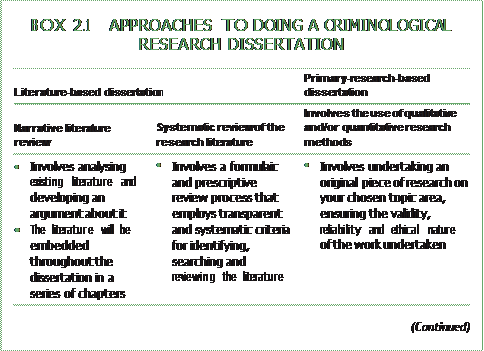 |
Getting started:planning criminological research
|
|
|
|
GETTING STARTED: PLANNING CRIMINOLOGICAL RESEARCH
 Undergraduate and postgraduate degree courses provide numerous opportunities for criminological research to be undertaken. These can occur in specific modules where you are tasked with formulating a research question, applying a specific data collection
Undergraduate and postgraduate degree courses provide numerous opportunities for criminological research to be undertaken. These can occur in specific modules where you are tasked with formulating a research question, applying a specific data collection
 method, analysing a particular data set, or developing a research proposal, with the key learning outcomes assessed as part of the final summative assignment. However, the first real opportunity that many of you will get to undertake a substantial piece of criminological research on your own is for your final-year dissertation project.
method, analysing a particular data set, or developing a research proposal, with the key learning outcomes assessed as part of the final summative assignment. However, the first real opportunity that many of you will get to undertake a substantial piece of criminological research on your own is for your final-year dissertation project.
Planning dissertation research
For undergraduate and postgraduate study, the dissertation is the capstone project, the end point of your learning, one that brings together everything you have learnt into a single piece of self-directed work, initiated, planned, undertaken and written up by you. That is why it is viewed as a major piece of independent study. Whilst you will have a supervisor, ultimately it is down to you to plan and propose the research, as well as to carry it out in the time frame set. Criminological dissertations usually involve one of two approaches: either they involve undertaking a literature-based study, by way of a narrative review or a systematic review; or they involve undertaking a primary piece of research. Sometimes the approach is determined by the university or college where you are studying; often, it is up to you to define which is best suited to what you wish to achieve. Box 2. 1 identifies the key approaches to doing a criminological dissertation.
 |

Because of its relative importance to your degree classification, it is all too easy to become stricken with anxiety, uncertainty, desperation and panic when confronted with doing a dissertation. It may feel as though everything you have learned during your course about doing social research has drained away. You may feel a sense of loss as to what it is you wish to research, as you cannot think of a topic or you are unable to formulate an idea. Or, the wealth of literature may appear overwhelming, or the lack of existing research may seem a barrier to developing your own research ideas. Or you might not know how to connect what it is you are interested in with how you would go about researching it. These thoughts are understandable. Yet, don’t panic and don’t despair! Studying for an undergraduate or postgraduate degree is about challenge, curiosity and criticality. When planned well, with foresight and imagination, the dissertation can prove to be one of the most rewarding assignments that you will undertake, one that you will wish to tell others about, including poten- tial employers on graduation. Often, it will have pride of place on your CV. After all, it can define who you are and what you are interested in.
To help you cope with the pressures of planning and organizing your crimino- logical research, you may wish to read, alongside this chapter, some of the sources of guidance on dissertation preparation and academic writing detailed in Box 2. 2.

|
|
|


